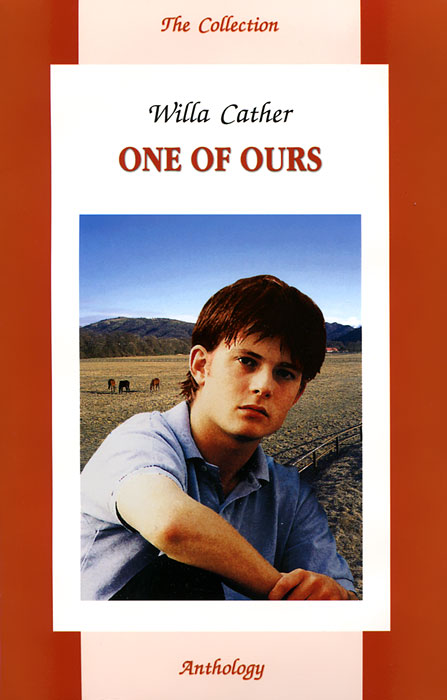Книга: Willa Cather «One of Ours»

|
Серия: "The Collection" Роман "Один из наших" - история молодого человека, который всеми силами стремится вырваться из гнетущей его патриархальной атмосферы жизни на Среднем Западе. Геройотвергает предначертанную ему судьбу и выбирает военные приключения во Франции во время Первой мировой войны. Издательство: "Антология" (2004) Формат: 84x108/32, 384 стр.
ISBN: 5-94962-040-2 Купить за 123 руб на Озоне |
Другие книги автора:
| Книга | Описание | Год | Цена | Тип книги |
|---|---|---|---|---|
| A Lost Lady | Marian Forrester is the symbolic flower of the Old American West. She draws her strength from that solid foundation, bringing delight and beauty to her elderly husband, to the small town of Sweet… — Vintage, (формат: 110x190, 192 стр.) Vintage Book Подробнее... | бумажная книга |
Willa Cather
Infobox Writer
name = Willa Sibert Cather

imagesize = 200px
caption = Cather in 1936.
pseudonym =
birthdate =
birthplace = near
deathdate =
deathplace =
occupation =
nationality = American
period = 1912-1947
genre =
subject =
movement =
influences =
influenced =
website =
Willa Sibert Cather (
Early life
Willa Cather was born in 1873 on a small farm in the Back Creek valley near
While in college, Cather became a regular contributor to the "
Cather was born into a
Writing career
Cather moved to
In New York Cather met a variety of authors.
In 1923 she was awarded the
Cather was celebrated by critics like
Later critics tended to favor more experimental authors. In times of political activism some attacked Cather, a political conservative, for writing about conditions of ordinary people, rather than working to change them.
Honors
Cather received both national and state honors. In 1973, the
Personal life
As a student at the University of Nebraska in the early 1890s, Cather sometimes used the masculine nickname "William" and wore masculine clothes. O'Brien, Sharon. Willa Cather: The Emerging Voice. New York: Oxford, 1987. pp. 96-113.] A photograph in the University of Nebraska archives depicts Cather, "her hair shingled, at a time when long hair was fashionable, and dressed boyishly." [Lewis, Edith. Willa Cather Living: A Personal Record, p. 38. Alfred Knopf, New York, 1953.]
Throughout Cather's adult life, her most significant relationships were with women. These included her college friend
Cather's romance with Lewis began in the early 1900s. The two women lived together in a series of apartments in New York City from 1912 until the writer's death in 1947. From 1913 to 1927, Cather and Lewis had lived at No. 5 Bank Street in
In her later life, Cather spent summers on
Cather is buried in
A resolutely private person, Cather destroyed many old drafts, personal papers, and letters. Her will restricted the ability of scholars to quote from those personal papers that remain. Since the 1980s, feminist and other academic writers have explored Cather's sexual orientation and the influence of her female friendships on her work. [Ahern, Amy, "Willa Cather: Longer Biographical Sketch." The Willa Cather Archive, University of Nebraska. 21 March 2007 (http://cather.unl.edu).]
Cather received many honorary degrees, beginning with a doctorate from the University of Nebraska in 1917. She also received degrees from University of Michigan, Columbia, Yale, California at Berkely, Princeton, (the first to receive an honorary degree)and Smith College. [http://www.willacather.org/aboutcather_time.html]
Bibliography
Nonfiction
* Willa Cather and Georgine Milmine "
* Willa Cather "On Writing" (1949) (reprint U Nebraska Press, 1988)
*"
Novels
*"
*"
*"
*"
*"
*"
*"
*"
*"
*"
*"
*"
Collections
*"
*"
*"
*"
*"
This does not include recent collections of early stories which were originally published in periodicals. [cite web|url=http://cather.unl.edu/life/chronology.html
title=Cather's Life: Chronology
accessdate=2007-08-13
work=The Willa Cather Archive ] [cite web|url=http://cather.unl.edu/writings/shortfiction/index.html
title=Cather's Writings: Short Fiction
accessdate=2007-08-13
work=The Willa Cather Archive ]
References
External links
*
*
* [http://cather.unl.edu Willa Cather Archive] at
* [http://willacather.org/ Willa Cather Pioneer Memorial and Educational Foundation] in
* [http://www.nebraskahistory.org/lib-arch/research/manuscripts/family/cather.htm Willa Cather papers] at
* [http://www.nebraskapress.unl.edu/product/On-the-Divide,673971.aspx On the Divide: The Many Lives of Willa Cather] by David Porter (University of Nebraska Press, 2008)
Источник: Willa Cather
См. также в других словарях:
One of Ours — First edition … Wikipedia
one — [ wʌn ] function word *** One can be used in the following ways: as a number: We have only one child. How much does one pound of apples cost? as a determiner: He grew roses on one side of his garden, and vegetables on the other. We ll meet again… … Usage of the words and phrases in modern English
one */*/*/ — UK [wʌn] / US determiner, number, pronoun Summary: One can be used in the following ways: as a number: We have only one child. ♦ How much does one pound of apples cost? as a determiner: He grew roses on one side of his garden, and vegetables on… … English dictionary
Ours (song) — Ours Single by Taylor Swift from the album Speak Now Released November 28, 2011 (2011 11 28) Format … Wikipedia
Ours (animal) — Ours Pour les articles homonymes, voir Ours (homonymie). Pour l’article homophone, voir Ource … Wikipédia en Français
Ours (mammifère) — Ours Pour les articles homonymes, voir Ours (homonymie). Pour l’article homophone, voir Ource … Wikipédia en Français
